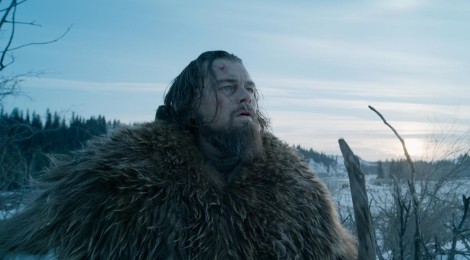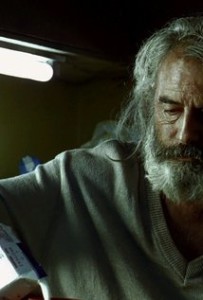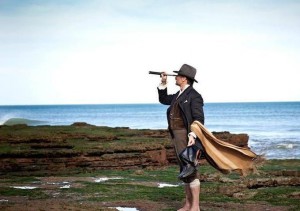
DOLORES TIERNEY ON THE REVENANT (ALEJANDRO GONZÁLEZ IŇÁRRITU, 2016)
Following last night’s Academy Awards ceremony, Mediático co-editor Dolores Tierney assesses Alejandro G. Iñárritu’s The Revenant in light of its historic wins for Best Director, Best Actor and Best Cinematography and concerns over the racism of the Academy of Motion Picture Arts and Sciences. The University of Sussex will be hosting a one day symposium on Iñárritu in May
This year during the run up to the Oscars I had a strong sense of déjà vu. Like last year, a film (The Revenant) by a director I’m working on (Iňárritu) was nominated for a slew of Oscars -twelve in fact, the most nominations for a single film. Like last year, I’ve been pondering what both The Revenant itself and its Oscar nominations and now success means for the auteurist summation I had previously made of Iňárritu’s work. But unlike last year, where Iňárritu’s Birdman was concerned, this year with The Revenant, it has been what has been going on outside of Iňárritu’s film, that has been dominating how I and many others are reading it. Now that the ceremony is over and the film has won three of the most important awards (for Best Director, Best Actor and Best Cinematography), I’m still left wondering where this film fits into Iňárritu’s oeuvre and into the U.S. film industry.
In 2016, as in 2015, the Academy has been called out for the lack of diversity in its award nominations for talent both in front of and behind the camera. In January and February the Twitter hashtag #OscarsSoWhite1 trended amongst commentators and industry personnel to signal dismay at the lack of nominations received by actors of colour despite the strong performances (and, in many cases, nods from other awarding industry bodies) for: Idris Elba in Beasts of No Nation (Cary Joji Fukunaga), Will Smith in Concussion (Peter Landesman), Michael B. Jordan and Tessa White (Creed) and Benicio Del Toro in Sicario (Denis Villeneuve) amongst others. In the midst of #OscarsSoWhite, Iňárritu was held up by Rolling Stone, Vanity Fair and other publications as “the only person of colour to be nominated in any of the major categories.” Spike Lee has called Iňárritu out for not speaking to the issue of representation in the industry previously (suggesting that because he himself was nominated in both 2015 and 2016 he wasn’t bothered about representation of diversities). Iňárritu himself has (like others) suggested that the problem lies not just in the nomination process but in the structural racism of an industry (and an Academy) that is overwhelmingly white. Iňárritu has also (in his DGA award acceptance speech and his BAFTA acceptance speech) asserted his own and the film’s diversity credentials: aligning himself and his award with his fellow (hardworking) Mexicans and Latin Americans and against Trump’s stereotypes and emphasizing his film as the story of a father and his mixed race son. Accepting the history-making Oscar for Best Director (joining Joseph L. Mankiewicz and John Ford the last two directors to win consecutive Best Director Oscars in consecutive years) Iňárritu quoted a line from his film, one of Glass’s comments to his mixed race son: “They don’t listen to you. They just see the color of your skin.” Iňárritu went on to say (defying the orchestra that was trying to speed his departure off stage)
So what a great opportunity to our generation, to really liberate ourself from all prejudice and this tribal thinking and make sure for once and forever that the color of the skin become as irrelevant as the length of our hair.
Iňárritu’s epic is based on the life of Hugh Glass (Leonardo Di Caprio) a nineteenth century fur trapper. Mauled by a bear and then left to die by Fitzgerald (Tom Hardy) the fellow trapper charged with caring for him, Glass fights his way back to life and civilization so that he might get revenge on Fitzgerald for the murder of his son. Despite the fuss made of Iňárritu’s nationality and ethnicity, it has been suggested (by Ato Quayson) that the film unproblematically supports a narrative of white settler colonialism in the American North West, privileging the abilities of one white man to survive the harsh winter and a near death experience. Such readings, which posit that the film might have been more critical of white settler colonialism “with more diverse voices in Hollywood” disavow not just Iňárritu’s own position as a Mexican director (and his co-scriptwriter credit for the film), but also a body of work which has often criticised the racism (Babel) and certainties (21 Grams) of U.S. modernity, its border controls, its foreign policy and its ideology.
Such perspectives also disavow the way the film makes clear Glass’s rugged ability to survive and be “reborn”, come not from a superiority that is inherently white, but from the care given to him by Hikuc (Arthur Redcloud) the Pawnee man he meets. It is Hikuc who generously tends to the wounds from Glass’s bear attack and is the only reason Glass survives, making his subsequent murder by a group of (it has to be noted) much less sympathetically characterised French fur trappers all the more condemnable. The film also suggests that Glass’s abilities to track and then survive after Hikuc are not intrinsic to his whiteness but learned through his time living in the Pawnee village with his wife and child Hawk (Forrest Goodluck) which we see largely in flashback.
The Revenant is nevertheless a departure for Iňárritu in several ways. Whereas his previous English language films (21 Grams, Babel, and Birdman) were “independent” films made by speciality houses (New Regency, Fox Searchlight, Focus Features, Paramount Vantage) belonging to the studios, The Revenant is his first with a major studio (20th Century Fox). The Revenant is also a genre film which takes its shape and conventions from the Western, a genre classically understood to support and foster a narrative of American whiteness. Although, as I’ve noted of Ford’s later films (and this is another point of contact between Iňárritu and the Irish-American director) not all representations of “others” within the Western necessarily adhere completely to this dominant ideology
The Revenant also adheres to several themes and techniques that have been constants in Iňárritu’s aesthetic armoury. Firstly, it continues with the position taken by Birdman in advocating authenticity in filmcraft. As the (third consecutive) Oscar for Mexican cinematographer Emmanuel Lubezki recognises, The Revenant‘s punishing shoot involved the use of only available light and other realist techniques (long takes, location shooting in sub zero temperatures) and, in many instances the overt shunning of any facilitating film technology such as computer generated imagery (other than for the bear attack, the stampeding bison and a number of other key moments)that would compromise that authenticity or fabricate its spectacle. DiCaprio’s performance as Glass in which he eats a raw bison liver and a raw fish, plunges into icy water, and crawls into a dead horse to keep warm, (as his award for Best Actor also attests) is equally part of the film’s authenticity credentials.
Additionally, Glass is not the first revenant to appear in an Iňárritu film. In Amores perros (2000) El Chivo, (Emilio Echeverría) the ex University Lecturer turned guerilla fighter and now contract killer becomes a revenant of sorts returning (awkwardly) to his daughter and to society and acting as a kind of ghost and conscience of Mexico’s violent past.

And also, lest we are tempted to envelope the film entirely within the representational norms of the U.S. industry, The Revenant also has something in common with another film from a Latin American director, Juaja (Lisandro Alonso, Argentina, 2015). Juaja, also dealing with the history of European colonialism, is a kind of Revenant-lite. But instead of it being about a father who lost his son (and attempts to get revenge on his killer) Juaja is about a father (Viggo Mortensen) who has lost his daughter (like two of Alonso’s other films Los muertos and Liverpool) and wanders seemingly aimlessly over Patagonia to find her.

- Coined by Broadway Black managing editor April Reign in 2015 to bring attention to the Academy’s overlooking performances and achievements by non-white actors, directors, screenwriters, and beyond ↩






